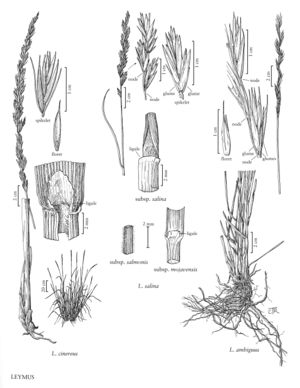Difference between revisions of "Leymus cinereus"
FNA>Volume Importer |
imported>Volume Importer |
||
| (7 intermediate revisions by 2 users not shown) | |||
| Line 4: | Line 4: | ||
|publications= | |publications= | ||
|common_names=Great basin wildrye | |common_names=Great basin wildrye | ||
| + | |special_status={{Treatment/ID/Special_status | ||
| + | |code=E | ||
| + | |label=Endemic | ||
| + | }} | ||
|basionyms= | |basionyms= | ||
|synonyms={{Treatment/ID/Synonym | |synonyms={{Treatment/ID/Synonym | ||
|name=Elymus piperi | |name=Elymus piperi | ||
| − | |authority= | + | |authority= |
| + | |rank=species | ||
}} {{Treatment/ID/Synonym | }} {{Treatment/ID/Synonym | ||
|name=Elymus cinereus | |name=Elymus cinereus | ||
| − | |authority= | + | |authority= |
| + | |rank=species | ||
}} | }} | ||
|hierarchy=Poaceae;Poaceae subfam. Pooideae;Poaceae tribe Triticeae;Leymus;Leymus cinereus | |hierarchy=Poaceae;Poaceae subfam. Pooideae;Poaceae tribe Triticeae;Leymus;Leymus cinereus | ||
| Line 32: | Line 38: | ||
-->{{#Taxon: | -->{{#Taxon: | ||
name=Leymus cinereus | name=Leymus cinereus | ||
| − | |||
|authority=(Scribn. & Merr.) Á. Löve | |authority=(Scribn. & Merr.) Á. Löve | ||
|rank=species | |rank=species | ||
| Line 39: | Line 44: | ||
|basionyms= | |basionyms= | ||
|family=Poaceae | |family=Poaceae | ||
| + | |illustrator=Cindy Roché | ||
| + | |illustration copyright=Utah State University | ||
|distribution=Colo.;N.Mex.;Wash.;Utah;Calif.;Minn.;Nebr.;S.Dak.;Oreg.;Alta.;B.C.;Sask.;Mont.;Wyo.;Ariz.;Idaho;Nev. | |distribution=Colo.;N.Mex.;Wash.;Utah;Calif.;Minn.;Nebr.;S.Dak.;Oreg.;Alta.;B.C.;Sask.;Mont.;Wyo.;Ariz.;Idaho;Nev. | ||
|reference=None | |reference=None | ||
|publication title= | |publication title= | ||
|publication year= | |publication year= | ||
| − | |special status= | + | |special status=Endemic |
| − | |source xml=https:// | + | |source xml=https://bitbucket.org/aafc-mbb/fna-data-curation/src/200273ad09963decb8fc72550212de541d86569d/coarse_grained_fna_xml/V24/V24_521.xml |
|subfamily=Poaceae subfam. Pooideae | |subfamily=Poaceae subfam. Pooideae | ||
|tribe=Poaceae tribe Triticeae | |tribe=Poaceae tribe Triticeae | ||
Latest revision as of 16:24, 11 May 2021
Plants strongly cespitose, weakly rhizomatous, usually bright green, not glaucous. Culms 70-270 cm tall, 2-5 mm thick, many together, lowest nodes often pubescent, sometimes pubescent up to 1.5 cm below the inflorescence. Leaves exceeded by the spikes; sheaths glabrous or hairy; auricles to 1.5 mm; ligules 1.5-8 mm; blades 15-45 cm long, 3-12 mm wide, strongly involute to flat, abaxial surfaces glabrous, adaxial surfaces scabrous, 11-25-veined, veins subequal, prominently ribbed. Spikes 10-29 cm long, 8-17 mm wide, with 14-28 nodes and 2-7 spikelets per node; internodes 4-9 mm. Spikelets 9-25 mm, with 3-7 florets. Glumes 8-18 mm long, 0.5-2.5 mm wide, subulate distally, stiff, keeled, the central portion thicker than the margins, tapering from below midlength, smooth or scabrous, 0-1(3)-veined, veins inconspicuous at midlength; lemmas 6.5-12 mm, glabrous or hairy, hairs 0.1-0.3 mm, apices acute or awned, awns to 3 mm; anthers 4-7 mm, dehiscent. 2n = 28, 56.
Distribution
Colo., N.Mex., Wash., Utah, Calif., Minn., Nebr., S.Dak., Oreg., Alta., B.C., Sask., Mont., Wyo., Ariz., Idaho, Nev.
Discussion
Leymus cinereus grows along streams, gullies, and roadsides, and in gravelly to sandy areas in sagebrush and open woodlands. It is widespread and common in western North America. Leymus cinereus resembles Psathyrostacbys juncea, differing in its non-disarticulating rachises, larger spikelets with more florets, and longer ligules. Spontaneous hybridization between L. cinereus and L. triticoides is known; the hybrids do not have a scientific name. The rhizomes found in some specimens may reflect introgression from L. triticoides through such hybrids.
Selected References
None.
